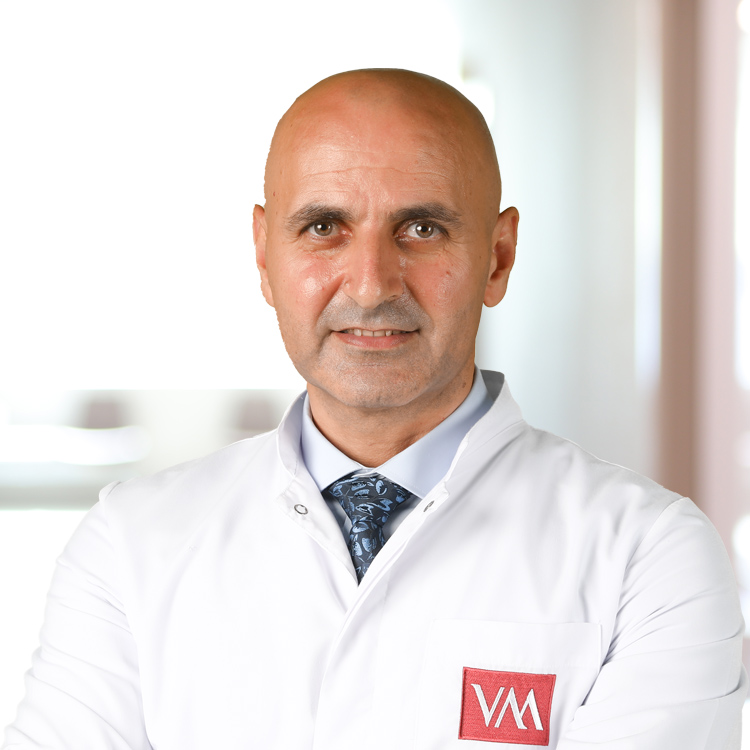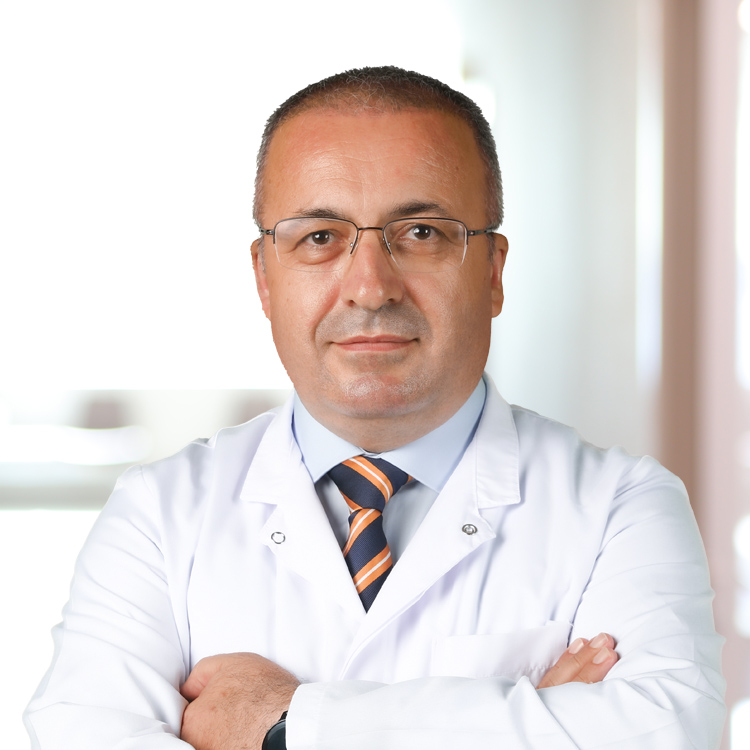Organ Transplantation
Make an Appointment
Online Schedule
IntroductionToday's transplantable organs
in contemporary medicine include the liver, kidneys, pancreas, heart, lungs, and heart-lungs concurrently. While Turkey has had a great success rate for liver, heart, and kidney transplant surgeries recently, pancreas transplants are also carried out.
Organ donors are crucial components in organ transplantations, in addition to the highly significant patient-doctor-hospital components. The waiting time lengthens every year as a result of the ongoing shortage of liver donors and the increasing prevalence of the liver disease. Each year, hundreds of individuals pass away while awaiting liver transplants.
The Health Department’s approval and licensing of Medical Park Hospital Organ Transplantation Center for organ (liver and kidney) transplantation and accompanying laboratory services makes it the first private healthcare facility to get these designations.
The Medical Park Hospital Organ Transplantation Center has a strong track record of performing successful liver and kidney transplants.
Liver Transplantation
Cirrhosis is the most typical cause of liver transplantation in adults. The disease known as cirrhosis, which is mostly brought on by Hepatitis B, destroys previously healthy liver cells. Some congenital disorders and some metabolic diseases are additional conditions that have been linked to cirrhosis.
A liver transplant is necessary if someone’s liver failure prevents them from carrying out their everyday activities.
Donors of livers might come from various sources. Typically, a cadaveric donor is used to obtain the liver (a person declared “brain dead” but all vital organs and systems are properly functioning). The waiting time lengthens every year as a result of the ongoing shortage of liver donors and the increasing prevalence of the liver disease. Every year, hundreds of individuals pass away while awaiting the transplant of a cadaveric liver. Family members or friends who donate a portion of their livers to the patient can likewise provide the donor’s livers.
Compatibility between blood types and liver sizes is crucial for a liver transplant. If a family member or friend is willing to donate a portion of their liver, it is feasible to save the patient’s life by removing the donor’s liver and transplanting it into the recipient.
Although a living donor does not necessarily need to be a blood relative of the receiver, the blood types must match. The donor must be in excellent health and have a charitable motivation for giving. After the recipient’s testing is finished, a donor review will be carried out to determine whether the living donation is a viable choice for the patient. The transplant team evaluates the donor and determines if the donation can be carried out. For youngsters, living donors are typically their sole option. The best candidates for liver transplants should have compatible blood types. Save the patient’s life in an emergency, it can even be done across blood types that don’t match. However, the liver sizes must match.
Frequently Asked Questions
What is a liver transplant?
The diseased liver is removed during surgery, and a healthy liver is put in its place.
What circumstances call for a liver transplant?
Numerous liver illnesses, including cirrhosis, some congenital diseases, and liver tumours are causes of a liver transplant.
Where do the livers for the transplants come from?
Whole livers are harvested from recently pronounced dead individuals (a person diagnosed as “brain dead” but all other organs and systems are properly functioning). Cadaveric donors fall under this category. The deceased person’s organs must have been donated, or the deceased person’s family must agree to give the organ after death before the liver can be removed from the body. It is legally forbidden to buy, sell, exchange, or donate organs.
Is it possible to perform a liver transplant from a living donor?
It is, indeed. It is feasible to save the patient’s life by taking a chunk of liver from the living donor and transplanting it to the recipient if a family member or friend is willing to give a part of their liver. Although blood type compatibility is required, a living donor need not be a blood relative of the recipient. The donor must be in excellent health and have a charitable motivation for giving. After the recipient’s testing is finished, a donor review will be carried out to determine whether the living donation is a viable choice for the patient. The transplant team evaluates the donor and determines whether or not the donation can be carried out. For youngsters, living donors are typically their sole option. The best candidates for liver transplants should have compatible blood types. Save the patient’s life in an emergency, it can even be done across blood types that don’t match. However, the liver sizes must match.
Can any liver be donated to anyone?
It can’t, though. To safely accomplish a liver transplant, there are several requirements. The donor needs to;
• Be around the same size and weight as the receiver
• Be free of liver-related illnesses, infections, or injuries
• Typically have the same blood type as the recipient or one that is compatible
In extreme circumstances, a liver transplant between two people with incompatible blood types may be performed to preserve the patient’s life.
Is liver transplant risky?
It is, indeed. Similar to any other procedure, a liver transplant carries dangers that are present in all types of major surgery. The postoperative period is rife with dangers, including infections, bleeding, and poor liver function from the graft. Infections may become a significant issue when the new liver does not operate as it should.
What is rejection?
When the recipient’s immune system attacks the transplanted organ or tissue, transplant rejection happens. The immune system of the human body defends itself against pathogens, poisons, and cancer cells that could be damaging. Antigens are proteins that are present on the surfaces of these hazardous compounds. Antigens are attacked by the immune system if it recognizes them as aliens.
To help prevent blood transfusion reactions or transplant rejection, tissue is “typed” before the procedure to determine the antigens it contains. Foreign blood or tissue can do either.
Even though tissue typing makes sure that the organ or tissue is as similar to the recipient’s tissue as feasible, the match is frequently imperfect. Except for identical twins, no two people have the same tissue antigens.
Drugs that inhibit the immune system are required to stop organ rejection. Otherwise, immunological reactions would be triggered by organ and tissue transplantation, leading to the foreign tissue’s demise.
Treatment aims to control the recipient’s immune reaction while ensuring that the transplanted organ or tissue functions properly. Transplant rejection can be treated and avoided by suppressing the immune response.
Is medication a lifelong affair following a liver transplant?
Yes, the patient will need antirejection medication for the rest of their lives. Regular medication use is necessary for a transplant to be successful. The patient’s immune system will instantly identify the organ as alien and begin to fight it if the medication is not given. Death or organ failure could result from this.
What is the success rate of liver transplants?
In Medical Park Hospitals, the success rate for liver transplants is on average 93.8 per cent.
Are patients able to return to their normal lives following the liver transplant?
Yes. Most patients who have a successful liver transplant can resume their regular daily activities. In reality, that is why the treatment is being done. After a liver transplant, it is also feasible to become pregnant and give birth. Within a year, the majority of people can exercise and engage in physical activity.
Kidney Transplantation
For individuals with chronic kidney disease who are nearing the end of their life, kidney transplantation is the best option.
Hemodialysis or peritoneal dialysis is required for patients who have lost at least 80% of their kidney function to survive. Numerous patients receive life support through dialysis, but it also creates many additional difficulties. The circulatory system damage it causes could harm the patient’s social life. The best option is a kidney transplant because of this. By guaranteeing that the kidney is functioning properly, a kidney transplant enhances the patient’s quality of life. However, not every patient with renal disease is a good candidate for a kidney transplant. To determine whether the patient is a candidate for a kidney transplant, some examinations and tests must be completed.
There are two types of donors:
a live donor (from a family member)
- Cadaveric donor (Despite being deemed brain dead, a person’s other important organs and systems are in good shape.)
The best way to categorize donor-recipient matching is into three separate categories: cross-matching, tissue typing, and blood typing. These are all unique and significant components of donor-recipient matching.
Blood Type Matching
The basic kidney transplant requirements are fairly similar to those for blood transfusions.
For humans, there are four main blood kinds. The blood types O, A, B, and AB are simply identified as such. There is a third antigen known as the Rh factor in addition to the A and B antigens. Either the Rh factor is present (+) or it is not (-). The factor, however, does not affect the kidney; rather, it solely affects a certain type of blood cell. Therefore, the positive or negative characteristics of blood type have little bearing on how well a kidney is matched between a donor and a recipient.
Only blood type O donors may donate a kidney to a recipient who has that blood type. A blood type A recipient may receive a kidney from a blood type O or A recipient, and a blood type B recipient may receive a kidney from a blood type O or B donor. Naturally, a donor with blood type AB can donate a kidney to a recipient with any blood type.
Tissue Matching
A transplanted kidney will live longer the more closely the donor and recipient’s tissues match. For 5 years, a kidney with a 0 mismatch rate has a 40% higher probability of survival than one with a 4-6 mismatch rate. When receiving a transplant from a relative or a cadaver, tissue matching is essential. Tissue matching may not be necessary for circumstances where a patient has no other suitable options for transplantation (spouses or unrelated donors).
Panel Reactive Antibodies (PRA)
An immunological test called PRA is used to gauge the body’s immune system function. More antibodies are produced when PRA levels appear to be higher. Pregnancy or previous transplants may cause PRA. Before the transplant can happen, it must be confirmed whether certain HLA antibodies are present. Rejection could occur if this antibody is not found. With medical intervention, these antibodies may decrease.
Treatments during the year.
Treatments during the year.
Treatments during the year.


Organ Transplant Liver transplant
The patient has liver failure and complaints of january, cirrhosis.
Diagnosis and treatment due to liver failure in an early period.
Living or cad liver transplantation.
Blood tests, mri, tomography, biopsy.
Vaccination & Testing
Our Hospital provide the highest quality care to improve the health of our entire community through innovation, collaboration, service excellence, diversity and a commitment to patient safety





